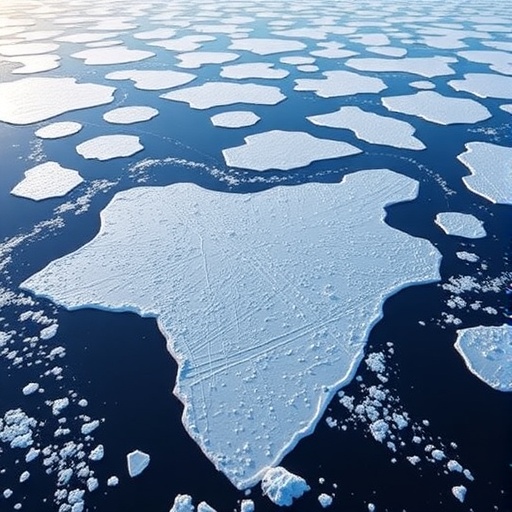The Arctic region has become a focal point in discussions surrounding climate change, with significant attention directed towards understanding its mechanisms and consequences. One of the critical components of this discussion is the role of sea ice, which has dramatically altered in both volume and extent over recent decades. A new study conducted by Chung et al. sheds light on the intricate relationship between sea ice and Arctic amplification, offering insights into the future of polar ecosystems and their global implications.
Recent findings indicate that the reduction of sea ice serves as both a symptom of global warming and a catalyst that intensifies it. As sea ice diminishes, the Arctic Ocean absorbs more solar radiation, contributing to a higher local temperature. This phenomenon, known as Arctic amplification, creates a feedback loop where warming leads to more ice melt, which in turn leads to further warming. The study underscores the importance of sea ice not merely as a geographical feature but as a crucial player in the climate system.
Researchers employed advanced climate models to simulate future scenarios, taking into account factors such as greenhouse gas emissions and natural variability. The projections reveal that, without significant mitigation efforts, Arctic temperatures could rise substantially by mid-century. The loss of sea ice is expected to accelerate, leading to unprecedented changes in weather patterns, including more extreme weather events worldwide. This underscores the need for urgent climate action to address underlying causes.
The study highlights a worrying trend as the Arctic continues to warm rapidly, leading to the degradation of the ice cover that has historically protected the region. The researchers noted that sea ice acts as an insulating barrier, influencing not only marine life but also terrestrial ecosystems and atmospheric conditions. Its disappearance could lead to alterations in ocean currents that play a vital role in regulating global temperature patterns.
Moreover, the research delves into the biodiversity impacts resulting from altered sea ice dynamics. Polar species such as seals, polar bears, and various types of fish rely on stable ice conditions for breeding and foraging. As the ice retreats, these species face habitat loss, leading to declines in population and biodiversity. Such shifts can have cascading effects throughout the food web, ultimately affecting human communities that depend on these species for sustenance.
Pollution and increasing maritime traffic are additional concerns highlighted by the study. As sea ice diminishes, the Arctic is becoming more accessible for shipping routes and resource extraction. This influx potentially introduces more pollutants, exacerbating already fragile ecosystems. The researchers emphasize the importance of monitoring these human activities and assessing their long-term effects on the Arctic environment.
The research team included a diverse array of experts from various fields, indicating the multidisciplinary nature of climate science. By integrating perspectives from oceanography, atmospheric science, and ecology, the study provides a comprehensive overview of the challenges facing the Arctic. It also illustrates the importance of collaboration in tackling complex issues like climate change.
In response to the alarming trends, the study calls for enhanced global cooperation. Effective climate policies and sustainable management practices must be implemented to mitigate the impacts of climate change in the Arctic. The research serves as a clarion call for countries around the world to prioritize environmental stewardship and to commit to reducing carbon emissions precipitously.
As the Arctic continues to serve as a barometer for global climate health, the role of communication becomes paramount. Engaging with the public and raising awareness about the stakes involved in Arctic changes is essential. The findings from Chung et al. aim to inform policy-makers and increase public understanding of the interconnectedness of local changes and global systems.
Looking ahead, the future of Arctic sea ice remains uncertain. Predictions vary depending on global emission trajectories and climate policies. The study presents scenarios based on current trends, but emphasizes the possibility of altering this trajectory through collective action and innovation. The next few decades will be critical in determining the fate of the Arctic and, by extension, the climate system as a whole.
In conclusion, the role of sea ice in present and future Arctic amplification is complex and multifaceted. The study by Chung and colleagues emphasizes the urgent need for action and enhanced understanding of these phenomena. As we navigate through this period of rapid climatic shifts, the insights gained from such research will be crucial in informing policy, encouraging collaboration, and fostering resilience against the inevitable changes that lie ahead.
These dynamics underscore the necessity for ongoing research and public engagement in understanding the shifting realities of our planet. The Arctic stands as a stark reminder of the impacts of climate change, and by addressing these changes head-on, we can work towards safeguarding not only the polar regions but also the entire global ecosystem.
Subject of Research: The role of sea ice in Arctic amplification and its future implications
Article Title: The role of sea ice in present and future Arctic amplification
Article References:
Chung, ES., Kim, SJ., Ha, KJ. et al. The role of sea ice in present and future Arctic amplification.
Commun Earth Environ 6, 910 (2025). https://doi.org/10.1038/s43247-025-02834-9
Image Credits: AI Generated
DOI: https://doi.org/10.1038/s43247-025-02834-9
Keywords: Climate change, Arctic amplification, sea ice, environmental impact, biodiversity, climate action.




